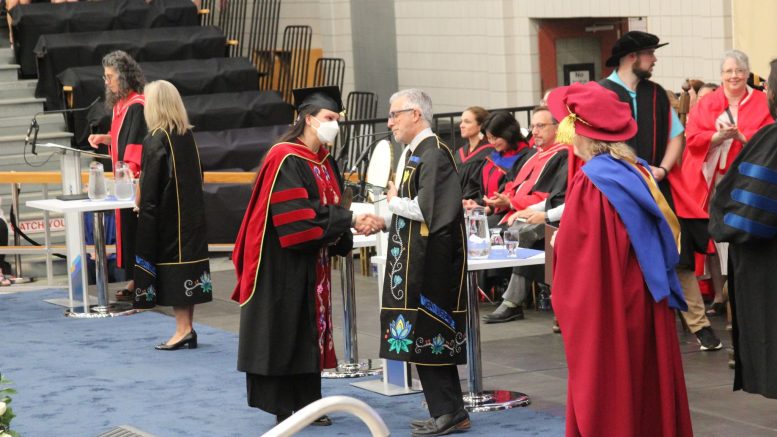In academia, the voices of Métis women have historically been marginalized, their narratives drowned out or erased. This issue was brought to the forefront by Laura Forsythe, an assistant professor at the University of Winnipeg whose graduate research at the U of M focused on unraveling the erasure experienced by Métis women within the academic sphere.
While working as the Métis inclusion co-ordinator at the U of M, Forsythe could see that work by Métis women was glaringly absent from academic discourse.
“I had featured them in many events at the University of Manitoba, having them come speak, and I was not seeing their publications on any of the syllabuses I had ever seen,” she said.
This prompted her research focus to turn toward understanding and highlighting the experiences of Métis women in the academic sphere.
“Being a Métis woman and experiencing two different institutions, four different degrees with a complete lack of Métis inclusion, I needed to find out how this was happening to our people, why this was happening to our people, and then eventually, what could we do about it?” she said.
Forsythe’s research methodology was unique, reflecting her close ties with many Métis theorists. She developed an intertwined Michif methodology — drawing from Keeoukaywin (the visiting methodology) theorized by Cindy Gaudet, Lii Taab di Faam Michif (the kitchen table methodology) and Kishkeeyitamaaniwan Kaa-natohtamihk, centred around learning through listening.
“It’s a really unique way of looking at ‘how do I honor all the women who sit in circle with me and ensure that I lift up their work while doing my own?’” she said.
The study identified three key themes contributing to the erasure of Métis women’s contributions to academia.
The first theme, colonial attempts at erasure, encompassed active efforts to erase Métis voices — ranging from the colonial education system to subtle forms of racism and whiteness.
The second theme highlighted attempts to make Métis identity invisible, with a lack of acknowledgement, credentials and connections among Métis women.
The third theme focused on power structures that sought to silence Métis voices, including umbrella publishing.
“When we publish under the word Indigenous, you don’t see what is Métis, what is First Nations, what is Inuit,” Forsythe explained.
She added that there are barriers to receiving Métis-specific funding.
“These larger structures were and continue to influence our ability to publish stories about ourselves,” she added.
Forsythe’s study went beyond identifying challenges. She dedicated an entire chapter of her dissertation to providing guidance for Métis individuals navigating the academic realm.
“I am less interested in what implications it has for the institution itself, but rather how we as Métis people can navigate that institution,” she said. “To me, that’s far more beneficial to my people.”
Alongside her colleagues, Forsythe has since established Pawaatamihk, a journal dedicated to Métis voices, challenging traditional publishing structures. Forsythe noted a recent article in the journal, “Walking with the Grandmothers and Aunties Wisdom,” which emphasizes the importance of being true to oneself, creating connections with other Métis individuals and resisting colonial pressures.
Additionally, an edited collection on Métis women’s contributions to academia is set to be released this spring.
Since her dissertation, Forsythe has hosted events like Mawachihitotaak and Métis Research Symposium at the U of W, providing platforms for Métis scholars to share knowledge and celebrate their unique perspectives.
“It was sort of the knowledge that I received from the grandmothers and the ways in which we needed to help ourselves, that I have now put forward a path for my own scholarship and my own career that is going to be around lifting up and creating spaces for Métis people to thrive in the academy,” she said.
“What the institution chooses to do with this information, that’s their prerogative,” she continued, “but I know that it has definitely changed the trajectory of many women I sit in circle with coming together and creating opportunities for our people.”
Forsythe encourages Métis scholars to continue reaching out, connecting and fostering a sense of belonging with each other.
“We are always excited to meet another Métis person in the academy, and always willing to help you get connected to develop relationships that will help foster a sense of belonging and a sense of self in an academy that’s not really meant for us,” she said.





